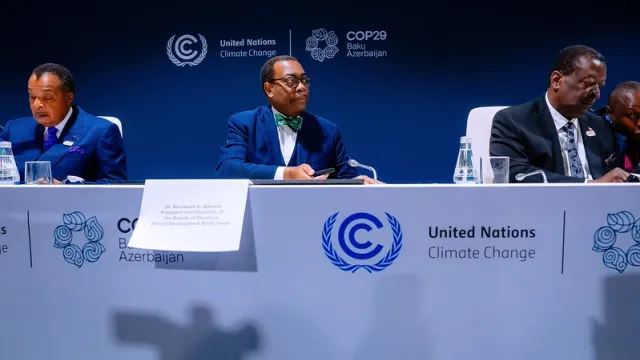Kenya pushes for Africa's $6 trillion GDP fairness at COP29

From Left: President of the Republic of Congo Denis Sassou Nguesso, President of the African Development Bank Group (AfDB) Dr. Akinwumi Adesina and Kenya's Prime Cabinet Secretary Musalia Mudavadi at a forum during the ongoing climate talks in Baku, Azerbaijan. (Photo/AfDB)
Kenya has joined hands with other economies in Africa, pushing for the global financial system to include the continent's vast natural wealth in accounting for the region's GDP.
This call comes amid concern that Africa was getting a raw deal on carbon prices compared to the lucrative prices reported in comparable markets such as Europe.
At the ongoing 29th Conference of the Parties (COP29) in Baku, Azerbaijan, leaders of government from African countries called for the continent's $6.2 trillion worth of natural wealth to be included in estimating the GDP of countries in Africa.
In a statement issued on Wednesday, leaders from Africa cited the contribution made to the world's environment by forests in Africa.
They said that the continent's forests are essential as they contribute to carbon sequestration, pollution control, retention of water, and soil fertility.
These issues were discussed at a high-level forum for Heads of State and government titled: Measuring the Green Wealth of Africa.
The session was jointly convened by the President of the Republic of Congo Denis Sassou Nguesso, and Kenya represented by Prime Cabinet Secretary Musalia Mudavadi, and the president of the African Development Bank Group (AfDB) Dr. Akinwumi Adesina.
“We are doing useful work for Africa and the rest of the world, in contributing to the acceleration of the recognition of the environmental dividend,” Denis Sassou Nguesso said.
In his statement, President William Ruto noted that at the heart of the leaders’ conversation is the need to “ensure that Africa’s ecosystem services such as carbon sequestration and pollution control are valued as global public goods.
He added, “by appropriately valuing our green wealth, countries can unlock financial flows into investments to boost our economies and even improve our credit ratings.”
President Sassou Nguesso said the Africa must make the best of its natural capital that is neglected or ignored in national accounts. This, he said, should be integrated as part of a country’s wealth.
Read also: COP29: UN-backed carbon market plan gets global support
Access to climate finance
On his part, President Paul Kagame of Rwanda said Africa is a key player in the fight against climate. “Unfortunately, Africa’s key obstacle remains access to climate finance.”
The Rwandan leader said he fully supports the bold agenda to measure the continent’s natural capital and added, “we are not asking for handouts but for the world to pay for something that has tremendous value for all of us.”
The leaders commended the African Development Bank Group for its leadership and dedication to finding innovative mechanisms to mobilize the required financial and technical support for natural capital accounting and measuring the Green GDP of African countries.
The Bank has produced a report on “Measuring the Green Wealth of Nations: Natural Capital and Economic Productivity in Africa”.
Dr. Adesina said the report sets out key actions to value and integrate natural capital in the measure of Africa’s GDP.
“Africa contributes significantly to global public good for tackling climate change with its vast resources of natural capital, its vast natural capital has been undervalued,” he pointed out.
This situation, he said, “makes Africa to be green rich but cash poor,” adding, “while the GDP of Africa was estimated at $2.5 trillion in 2018, this was 2.5 times lower than the estimated value of its natural capital, evaluated at $6.2 trillion, which partly includes some valuation of the ecosystem services.”
According to AfDB’s estimates and “based on very conservative assumptions… Africa’s nominal GDP in 2022 could have increased by $66.1 billion when adjusted for carbon sequestration only. That is more than the combined GDP of 42 African countries!”
The case for 'carbon grab' in Africa
The Bank Group chief expressed concern at what he described as ‘carbon grab’ where several African countries were giving away their vast amounts of land to carbon credits yet getting very little in return.
“While the price of carbon in Europe is high and could be as high as $200 per ton because of the strict EU Emission Trading Standards, carbon price in Africa could be as low as $3 to $10 per ton,” Adesina pointed out.
As a result, Adesina said, Africa gets underpaid for carbon because its carbon sinks are undervalued. Additionally, “the sequestered carbon on the lands can no longer be used as part of the nation’s nationally determined contributions,” he said, “that means countries lose sovereignty over their lands.”
According to Adesina, “the ongoing carbon grab in Africa is a lose-lose proposition.”
In their communique, African leaders said they will work with other developing countries and regions of the world, including Latin America and the Caribbean, as well as Asia, in forging a strong global alliance to ensure the inclusion of natural capital in the GDP of nations.
They will present a comprehensive report of the outcomes of the meeting before the Assembly of Heads of State and Government of the African Union at the 2025 summit for their consideration and adoption.



